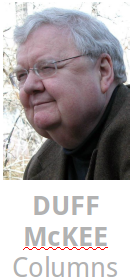
I hate writing about statistics. But, this is a column in which you’re going to have to wade through some, at times, confusing numbers to get the point. So, stick with me here. ‘Cause when that point comes, you’ll probably be as mad as I am.
The basis for my anger is found in an interesting report from the Americans for Tax Fairness (ATF), a coalition of 400 national and state-level progressive groups. While most members tilt slightly left politically, the numbers are real and the methodology pure statistical mechanics.
We, common variety taxpayers, have known since diaper-hood that corporations – large, faceless, and uncaring – have ripped off the tax system with loopholes, shifts, tricks, offshore stashes and bookkeeping slight-of-hand. All legal but foul smelling. But, maybe – just maybe – it’s worse than we thought.
The comprehensive numbers crunching by ATF this year dealt almost exclusively with Walmart. Previous deep dives into the books included the entire American fast food industry, auto companies and other large employers. In all cases, the bottom line was this: American taxpayers are heavily subsidizing all of them on the one hand – while being ripped off with tax breaks on the other.
Here are the Walmart numbers. And, this, my friends, is where you’ll find that elusive anger point I mentioned.
For the year 2013, “Walmart workers cost U.S. taxpayers an estimated $6.2 billion in public assistance including food stamps, Medicaid and subsidized housing. $6.2 billion right out of the ol’ taxpayer pockets.
Statisticians arbitrarily picked one Walmart superstore in Wisconsin. That store – that one store – cost taxpayers between $904,542 and $1.75 million per year! Every year! That worked out to between $3,015 and $5,815 on average for each of 300 employees!
ATF took the mid-point of that range ($4,415) and multiplied it by Walmart’s approximately 1.4 million workers. That’s how they got to the $6.2 billion direct cost to we taxpayers.
So, how did the numbers work out in our little Northwest neighborhood for just the Walmart ripoff? Well, Idaho has 7,026 Walmart employees for which the company receives $39.1 million in subsidies and tax breaks. Oregon’s 11,480 employees netted the company just over $70 million in subsidies and breaks. Washington had 19,350 employees and the company netted $120.2 million in government largesse.
Of the $6.2 billion overall cost to citizens, Idaho’s 7,026 employees racked up a $31 million hit to public assistance; Oregon’s 11,482 workers cost us $50.7 million and Washington’s 19,350 employees another $85.4 million drain to welfare programs.
Now, the “frosting on the cake” – how much Walmart’s U.S. stores took in through sales in just the food stamp program (SNAP). Bottom line in 2013 alone: $13.5 billion! Talk about taking it with both hands! That’s over 18% of all dollars paid out through the entire SNAP program coming back to Walmart!
And, if you’re wondering who was number two paying low wages which forced employees to use SNAP, that would be your famous “Golden Arches” folk who cost us all $1.2 billion more. And you can bet they sold millions of Big Mac’s to people who paid with food stamps. Again, gotcha coming and going..
Some of the crazier cretins along the Potomac want to badly curtail – or even eliminate – the SNAP subsidy. I would make a sizeable bet none of them have read the work of the Americans for Tax Fairness research. Or any other of the scholarly reports examining – in great detail – who the uses food stamps and why they have to just to survive.
But for the saner – and infinitely smarter – members of Congress, I’d recommend one of more than four dozen such tomes done by the Department of Defense. If they did, they’d find repeated conclusions showing more than 20% of food stamp users are in military uniform. And many of those are stateside families of one or more servicemen over in the live fire zones.
Come to think of it, that statistic makes me madder than the Walmart ripoff.
Share on Facebook

































